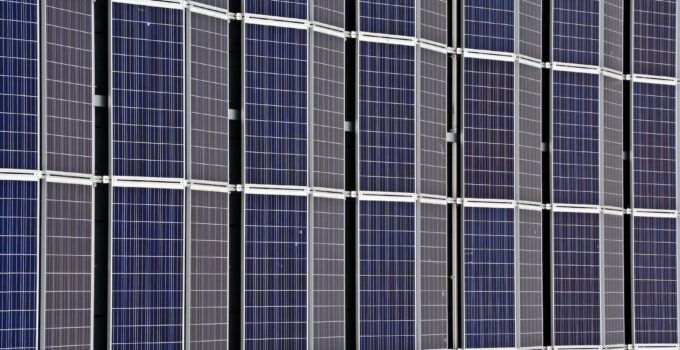Solar panels are a popular choice for renewable energy, providing clean and sustainable power. However, like any technology, solar panels have a lifespan and will eventually need to be disposed of properly.
In this ultimate guide, we will explore the importance of proper solar panel disposal and provide a step-by-step guide on how to do it safely. We will also discuss environmentally-friendly options, the difference between recycling and repurposing, and offer tips for finding local solar panel recycling programs.
Why is Proper Disposal of Solar Panels Important?
Proper disposal of solar panels is crucial for several reasons. Firstly, solar panels contain hazardous materials such as lead and cadmium, which can be harmful to human health and the environment if not handled correctly. These toxins can leach into the soil and water, posing a risk to wildlife and ecosystems.
Secondly, solar panels are made up of valuable materials like silicon, aluminum, and glass, which can be recycled and reused. By disposing of solar panels properly, we can recover these valuable resources and reduce the need for new raw materials, thus minimizing the environmental impact of solar panel production.
Understanding the Components of Solar Panels
Before we delve into the disposal process, let’s first understand the components of solar panels. Solar panels consist of several key parts:
- Solar Cells: These are the individual units that convert sunlight into electricity.
- Encapsulation: Solar cells are encapsulated in a protective layer of materials like ethylene-vinyl acetate (EVA) and Tedlar, which shield them from moisture and physical damage.
- Frame: The frame provides structural support and protection for the solar panel.
- Backsheet: The backsheet is a layer that protects the solar panel from environmental factors like humidity and UV radiation.
- Junction Box: This is where the electrical connections are made, allowing the solar panel to be connected to other panels or to an inverter.
Step-by-Step Guide to Safely Dispose of Solar Panels
When it comes time to dispose of your solar panels, follow these steps to ensure safe and responsible disposal:
- Check Local Regulations: Before disposing of solar panels, check your local regulations regarding their disposal. Some areas have specific guidelines or recycling programs in place.
- Contact the Manufacturer: Reach out to the manufacturer of your solar panels. They may have a take-back program or suggestions for proper disposal.
- Disconnect and Remove: Disconnect the solar panels from any electrical connections. Carefully remove them from their mounting system or roof, following any safety guidelines provided by the manufacturer.
- Handle with Care: Solar panels are fragile, so handle them with care to prevent breakage. Wear protective gloves and eyewear to avoid injury.
- Package Securely: Securely package the solar panels for transportation. Use packaging materials such as bubble wrap or foam to protect them during transit.
- Find a Recycling Facility: Locate a recycling facility or program that accepts solar panels. Many recycling centers now accept solar panels and will properly handle their disposal.
- Follow Recycling Guidelines: When delivering the solar panels to the recycling facility, follow their specific guidelines for drop-off or collection. Some facilities may require appointments or have specific hours of operation.
- Record Disposal: Keep a record of the disposal process, including dates, locations, and any receipts or certificates provided by the recycling facility. This documentation may be required for regulatory compliance or warranty purposes.
Environmentally-friendly Options for Solar Panel Disposal
When disposing of solar panels, it’s essential to explore environmentally-friendly options. Here are a few alternatives to consider:
- Recycling: Recycling is the most common and environmentally-friendly option for solar panel disposal. Recycling facilities can recover valuable materials like silicon, aluminum, and glass, reducing the need for new raw materials.
- Repurposing: If your solar panels are still functional but no longer suitable for your needs, consider repurposing them. They can be used for projects like solar-powered water heaters, garden lights, or charging stations.
- Donation: If your solar panels are in good condition, consider donating them to organizations or individuals who could benefit from them. This not only extends the lifespan of the panels but also promotes the use of renewable energy.
Recycling vs. Repurposing: Which is the Best Approach?
When deciding between recycling and repurposing, it’s important to consider the condition of your solar panels and your personal preferences. Recycling is the best approach for damaged or non-functional panels, as it allows for the recovery of valuable materials. Repurposing is ideal for panels that are still in good condition and can be used for other applications.
Tips for Finding Local Solar Panel Recycling Programs
Finding local solar panel recycling programs can be challenging, but here are some tips to help you in your search:
- Check with Manufacturers: Reach out to the manufacturers of your solar panels and inquire about their recycling programs or recommendations.
- Contact Local Recycling Centers: Contact recycling centers in your area and ask if they accept solar panels for recycling. Some centers may have specific requirements or partnerships with specialized recycling facilities.
- Consult Government Resources: Government agencies or environmental departments often provide resources or directories of recycling programs. Check their websites or contact them directly for information.
- Research Online: Use online search engines or directories to find local solar panel recycling programs. Websites like Earth911 or the Solar Energy Industries Association (SEIA) can provide valuable information and resources.
Frequently Asked Questions about How to Dispose of Solar Panels Properly
Here are some common questions about how to dispose of solar panels properly:
Q: Can I throw solar panels in the regular trash?
A: No, solar panels should not be thrown in regular trash. They contain hazardous materials and should be properly recycled or disposed of through designated programs.
Q: How long do solar panels last?
A: Solar panels typically have a lifespan of 25-30 years. After this period, their efficiency may decline, making them less effective for generating electricity.
Q: Are there any incentives for recycling solar panels?
A: Some states or countries offer incentives or rebate programs for recycling solar panels. Check with local authorities or recycling facilities to see if any incentives are available in your area.
Q: Can I recycle solar panels myself?
A: It is recommended to take solar panels to specialized recycling facilities rather than attempting to recycle them yourself. These facilities have the expertise and equipment to handle the recycling process safely.
Expert Advice
Dispose of solar panels properly by following local regulations and guidelines. Contact the manufacturer for specific instructions and consider recycling as the most environmentally-friendly option. If the panels are still functional, explore repurposing or donation opportunities to extend their lifespan.






